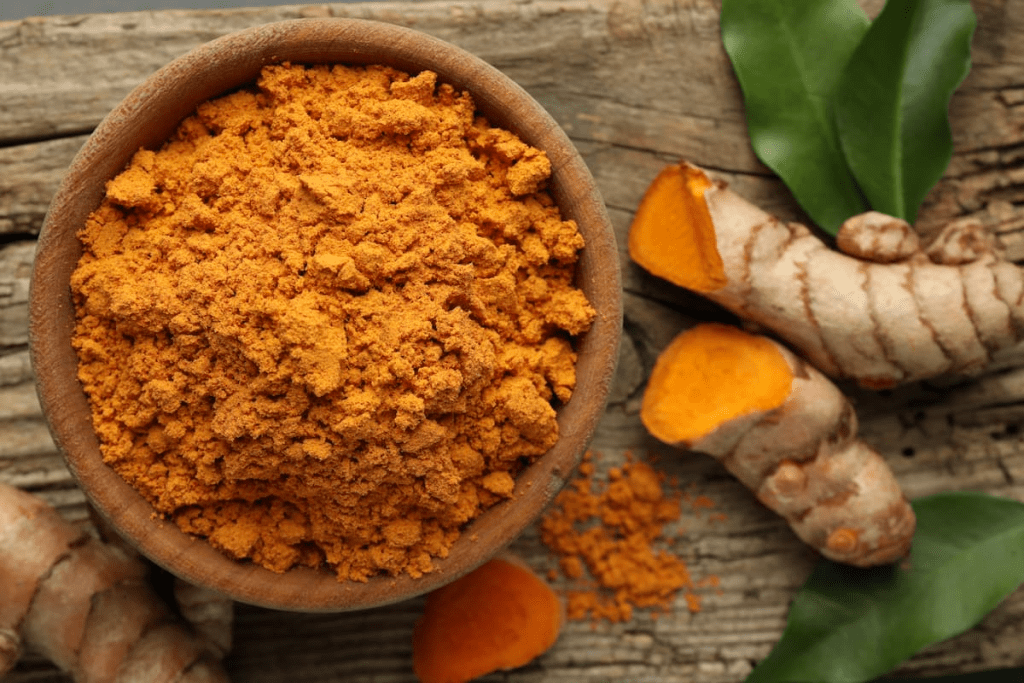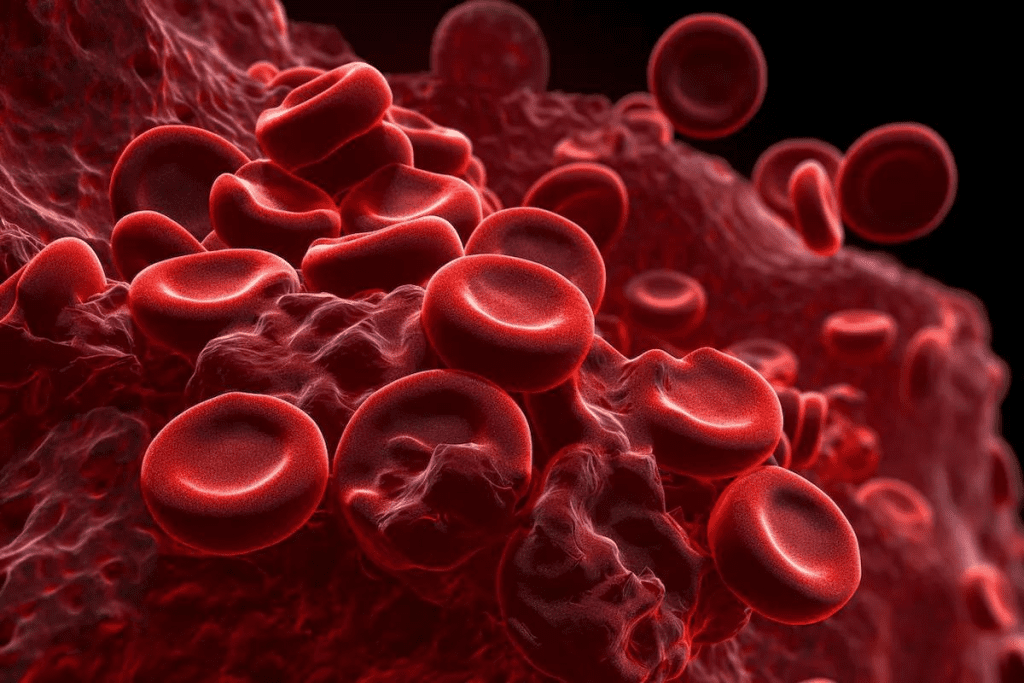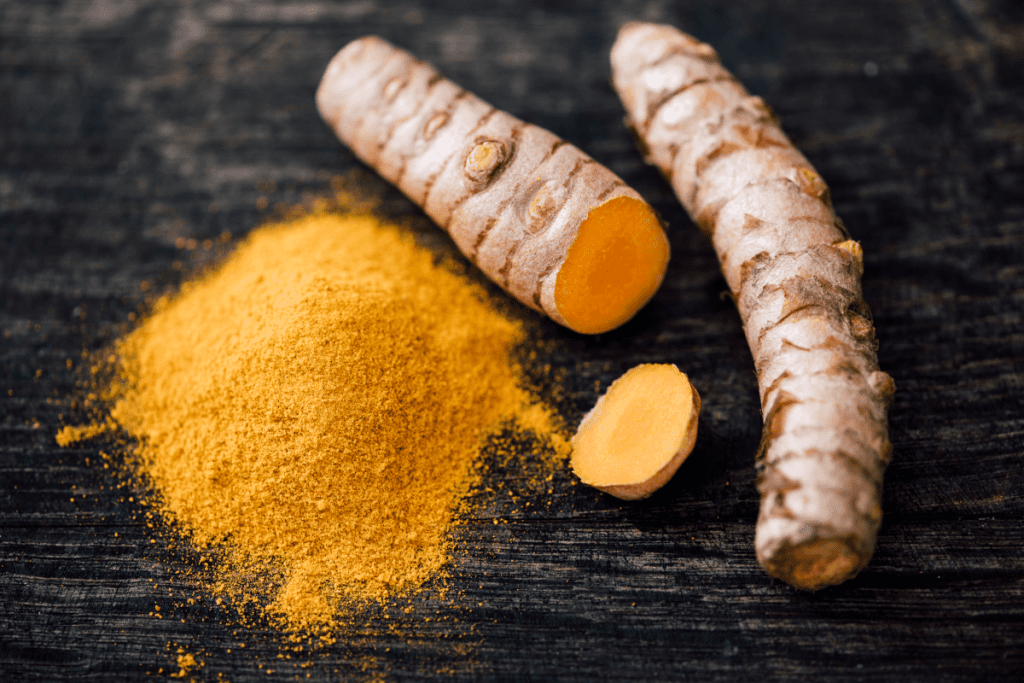
We look into the link between turmeric and platelet count. We check out the newest findings on curcumin‘s role in boosting platelet health. Does turmeric increase platelet count? Explore the link between turmeric blood clots and its positive (or negative) effects. Crucial facts for supplement users.
Turmeric, a spice like ginger, is key in curry powder. Its main part, curcumin, offers many health perks. It might even help increase platelet counts.
New studies show curcumin can help platelet count. It stops platelets from sticking together. This makes turmeric a great choice for keeping healthy.
Key Takeaways
- Turmeric’s active compound, curcumin, may support higher platelet counts.
- Curcumin has been shown to inhibit platelet activation and aggregation.
- The health benefits of turmeric go beyond cooking.
- Curcumin’s effect on platelet count is good for overall health.
- Turmeric could be a smart part of a health plan.
The Role of Platelets in Blood Health
It’s important to know how platelets help keep our blood healthy. Supplements like turmeric can affect our health in different ways. Platelets are small cells that help stop bleeding and are made in our bodies all the time.

What are Platelets and Their Normal Ranges?
Platelets are key to blood clotting. They are made in the bone marrow and move through our blood. A normal platelet count is between 150,000 to 450,000 per microliter of blood.
A count below 150,000 is called thrombocytopenia, and above 450,000 is thrombocytosis. Knowing these numbers helps doctors diagnose and treat platelet problems.
Causes and Consequences of Low Platelet Count
A low platelet count, or thrombocytopenia, can come from many things. This includes bone marrow issues, some medicines, and autoimmune diseases. It can cause easy bruising and bleeding gums, and even serious bleeding.
In severe cases, it can lead to life-threatening hemorrhage. Finding out why it happens is key to treating it.
How Platelet Count Affects Overall Health
The platelet count affects our health, mainly in bleeding and clotting. An abnormal count can mean there’s a health problem. For example, low platelets might show bone marrow failure or an immune issue.
High platelets could mean infection, inflammation, or a disorder. Keeping platelet counts healthy is vital to avoid problems and stay well.
Turmeric and Its Bioactive Compounds
Turmeric’s health benefits come from its bioactive compounds. We’ll look at these compounds, focusing on curcumin and its role in traditional medicine.
Curcumin as the Primary Active Ingredient
Curcumin is the key compound in turmeric, giving it its bright yellow colour. It has anti-inflammatory and antioxidant properties, making it important in medical research. Curcumin can help reduce inflammation and manage chronic conditions.
Traditional Uses in Medicine
Turmeric has been used for centuries in traditional medicine, like Ayurveda and Chinese practices. It treats many issues, from digestive problems to skin conditions. Its health benefits are backed by modern science. Turmeric’s wide use shows its great therapeutic value.

Bioavailability Challenges and Solutions
Curcumin’s big problem is its poor bioavailability. This means it’s hard for the body to absorb. Scientists are working on ways to make curcumin more available. Improving bioavailability is key to curcumin’s effectiveness.
One way to boost curcumin’s bioavailability is with piperine from black pepper. Other methods include making nanoparticles and curcumin extracts that are easier to absorb.
The Science Behind Turmeric’s Interaction with Blood Clots Interaction
Turmeric, a spice used in cooking, interacts with blood clotting in interesting ways. The compound curcumin inturmeric affects blood clotting. This makes it a focus for researchers and those worried about heart health.
Dual Effects on Coagulation Pathways
Turmeric’s effect on blood clotting is complex. Curcumin can stop some clotting factors from activating. This might lower the risk of blood clots. Yet, it can also affect other pathways that might increase or decrease clotting, depending on the situation.
Key effects of turmeric on coagulation pathways include:
- Inhibition of platelet activation
- Modulation of clotting factor expression
- Enhancement of fibrinolysis
Platelet Activation and Aggregation Inhibition
Curcumin stops platelets from sticking together and forming clots. This could lower the risk of blood clots. But it’s important to remember this can be risky for people with bleeding problems or those on blood thinners.
The mechanisms behind curcumin’s effect on platelets involve complex signaling pathways, including the inhibition of cyclooxygenase (COX) enzymes and the modulation of intracellular calcium levels.
Paradoxical Effects in Different Conditions
Turmeric’s effect on blood clotting changes based on a person’s health. It might help in cases of too much clotting. But it could increase bleeding risk in other cases.
It’s important to remember:
- The dose and how turmeric is prepared can greatly affect its clotting effects.
- People with health issues or on medication should talk to a doctor before taking turmeric.
- We need more studies to understand turmeric’s effects on blood clotting in different health situations.
Research Evidence: Turmeric’s Impact on Platelet Count
Research has looked into how turmeric affects platelet count. This includes studies on animals and humans. These studies show how turmeric, and its active part, curcumin, can change platelet count and blood health.
Animal Studies Showing Positive Outcomes
Animal studies have shown that turmeric or curcumin can help increase platelet count. For example, a rat study with low platelet count found curcumin raised their platelet count. This shows turmeric might help with low platelet count issues.
Another mouse study found curcumin boosted platelet count and improved blood health. Curcumin’s anti-inflammatory and antioxidant properties likely help with these benefits.
Human Clinical Trials: Current Findings
Human trials are key to understanding turmeric’s effect on platelet count. Some trials have looked at curcumin’s impact on health conditions.
A study on chronic kidney disease patients found curcumin improved platelet count and blood health. But, there are not many human trials on turmeric and platelet count. More research is needed for clear results.
Limitations and Contradictions in Existing Research
Despite promising results, research on turmeric and platelet count has its limits. Different study designs, dosages, and lengths of turmeric or curcumin use lead to mixed results.
Some studies worry about turmeric’s antiplatelet effects. This could raise bleeding risks in some people. So, it’s important to talk to a doctor before using turmeric or curcumin if you have bleeding issues or are on blood thinners.
In summary, turmeric might help with platelet count, but more research is needed. We need to understand its effects and uses better.
Mechanisms of Action: How Turmeric Affects Platelets
To understand how turmeric affects platelet count, we need to look at its bioactive compounds. Turmeric, with its active ingredient curcumin, impacts platelet function in several ways.
Anti-inflammatory Pathways
Turmeric’s anti-inflammatory properties are key to its effect on platelets. Curcumin blocks pro-inflammatory cytokines, which can lead to platelet activation and aggregation. This reduction in inflammation may help keep platelet counts healthy.
A study found that curcumin’s anti-inflammatory effects can help the immune system. This can benefit platelet production and function.
“The anti-inflammatory properties of curcumin can significantly impact the body’s inflammatory response, which in turn may affect platelet count and function.”
Antioxidant Properties and Free Radical Reduction
Turmeric’s antioxidant properties are also vital for its impact on platelets. Curcumin is a strong antioxidant, fighting free radicals that harm platelets and disrupt their function. This helps protect platelets and supports blood health.
Effects on Bone Marrow Function and Platelet Production
Research shows turmeric may also affect bone marrow function, impacting platelet production. Curcumin boosts the production of blood cells, including platelets, by creating a healthy bone marrow environment. This is important for keeping platelet counts in check.
In summary, turmeric’s effects on platelets are complex. They involve anti-inflammatory pathways, antioxidant properties, and possibly influencing bone marrow function and platelet production. Understanding these mechanisms helps us see turmeric’s benefits for platelet health.
Turmeric and Anemia: Exploring the Connection
The link between turmeric and anemia is complex. It involves several ways that can help or harm those with anemia. Anemia means not enough red blood cells or hemoglobin, making it hard for tissues to get oxygen. Turmeric, with its curcumin, has been studied for its health benefits, including for anemia.
Influencing Red Blood Cell Production
Turmeric might help with red blood cell production because of its anti-inflammatory and antioxidant effects. Curcumin, the main part of turmeric, can change how blood cells are made. Studies show it can help make more erythropoietin, a hormone needed for red blood cells.
“Curcumin’s antioxidants can protect red blood cells from damage,” studies say. This is good for people with anemia from chronic diseases or oxidative stress.
Potential Benefits and Concerns for Anemia
Turmeric might help anemia by reducing inflammation and improving health. But it could also make it harder to absorb iron, which is key for some anemia types. Iron deficiency is a common cause of anemia, and anything that affects iron absorption could impact managing anemia.
- Turmeric may help make more red blood cells by affecting erythropoietin.
- Its anti-inflammatory effects can help with anemia of chronic disease.
- But too much turmeric might lower iron absorption, so it’s important to balance it.
Balancing Iron Absorption with Turmeric Consumption
To get the most from turmeric without harming anemia, it’s important to eat iron-rich foods or take supplements. Eating vitamin C with iron-rich foods can help absorb iron better. This might help counteract any negative effects of turmeric on iron absorption.
“The key to benefiting from turmeric while managing anemia lies in understanding its complex interactions with iron metabolism and red blood cell production.”
By managing how much turmeric you eat and watching its effects on anemia, you can enjoy its benefits while avoiding risks.
Vitamin B12 and Turmeric: Synergistic Effects
Vitamin B12 and turmeric together might boost blood cell production. Vitamin B12 is key to making red blood cells. Turmeric, with curcumin, fights inflammation and supports blood health.
How Vitamin B12 Affects Blood Cell Production
Vitamin B12 is vital for making DNA, needed for red blood cells. Without enough, you might feel tired, weak, and breathe short. It’s key to have enough vitamin B12 for healthy blood cells.
Not getting enough vitamin B12 can happen from diet or absorption issues. Taking vitamin B12 supplements can help fix these problems and support red blood cell production.
Turmeric and B12 Interaction in the Body
Turmeric (curcumin) and vitamin B12 work together in complex ways. Curcumin might help your body use vitamin B12 better. This teamwork could improve blood cell production and overall blood health.
Combined Supplementation Approaches
Using vitamin B12 and turmeric together might be a smart way to support blood health. Vitamin B12 provides the nutrients for blood cells, while turmeric keeps them healthy.
Before trying supplements together, talk to a doctor. They can help figure out the right amounts and check for any risks.
Supplements That Affect Platelet Count
Many dietary supplements can change platelet count, giving us other choices than turmeric. It’s key to know how these supplements affect platelet count and compare them to turmeric.
Supplements that Increase Platelets
Some supplements might raise platelet count. Here are a few:
- Papaya Leaf Extract: Studies show it can boost platelet count, helping with thrombocytopenia.
- Vitamin B12: It’s vital for making blood cells, including platelets. Low levels can cause low platelet counts.
- Folate: Like Vitamin B12, folate is key for blood cell production. Having enough folate helps keep platelet counts healthy.
Supplements that Lower Platelet Count
Some supplements might lower platelet count or change how platelets work. Here are a few:
- Omega-3 Fatty Acids: While good for the heart, too much can thin the blood and lower platelet count.
- Ginkgo Biloba: It can stop platelets from clumping, which is good in some cases but risky in others.
- Garlic Supplements: Garlic can slow down platelet clumping due to its natural anticoagulant properties.
Comparing Turmeric to Other Platelet-Affecting Supplements
Turmeric, with curcumin, is studied for its effects on platelet count and function. When we compare it to other supplements, several things matter:
- Efficacy: Turmeric’s impact on platelet count is being researched. Some studies suggest it might help, but more research is needed.
- Safety: Turmeric is usually safe in normal amounts. But high doses or supplements can interact with other medicines or worsen health issues.
- Interactions: Turmeric might interact with other supplements or medicines that affect platelet count or blood clotting. Always talk to a healthcare provider before mixing supplements.
It’s important to understand how different supplements affect platelet count. This helps us make smart choices for our health. Always talk to a healthcare professional before starting any new supplements.
Practical Applications: Using Turmeric for Blood Health
Turmeric is great for blood health. It has a special compound called curcumin. This compound helps keep your body healthy, including your blood.
Effective Dosages and Preparation Methods
To use turmeric for blood health, knowing the right amounts and how to prepare it is key. Studies show that 500-2000 mg of curcumin extract a day is good. You can take turmeric as a supplement, spice, or in drinks.
Preparation methods can make curcumin work better. For example, adding black pepper to turmeric boosts curcumin absorption. This is because black pepper has piperine.
Does Drinking Water Increase Platelet Count with Turmeric?
Drinking water with turmeric is interesting. While water doesn’t directly raise platelet count, it’s good for blood health. Drinking enough water with turmeric might help your body work better.
Incorporating Turmeric into a Daily Diet
Adding turmeric to your diet is easy and good for you. You can put turmeric in curries, soups, smoothies, or teas. If you prefer, you can also take turmeric or curcumin capsules.
- Add turmeric to your meals for flavor and nutrition.
- Consider turmeric or curcumin supplements after consulting a healthcare provider.
- Make a turmeric tea by mixing turmeric with hot water or milk.
Knowing how much turmeric to take and how to add it to your day can help your blood health.
Safety Considerations: Turmeric and Bleeding Risk
Turmeric supplements need careful thought, mainly about bleeding risks. Turmeric is usually safe in normal amounts. But high doses in supplements can be risky.
Interactions with Medications
Turmeric supplements can interact with some medicines, like blood thinners. Curcumin in turmeric can slow down platelet clumping. This might raise the chance of bleeding when taken with blood thinners.
If you’re on warfarin, aspirin, or clopidogrel, talk to your doctor before taking turmeric. It’s important to watch for bleeding risks and adjust your medicine as needed.
Pre-Surgery Considerations
People planning surgery should tell their doctors about turmeric use. It’s wise to stop taking turmeric 2 weeks before surgery to avoid too much bleeding.
Monitoring Platelet Levels
If you’re thinking about turmeric, and you have bleeding issues or take blood thinners, check your platelet levels often. This helps spot any problems early.
In summary, turmeric is good for many, but it’s important to think about bleeding risks and medication interactions. Being informed and talking to your doctor can help you use turmeric safely.
Conclusion: Evaluating Turmeric’s Role in Platelet Health
Turmeric’s effect on platelet count and blood health is getting more attention. We’ve looked into the evidence, and it shows turmeric, with its curcumin, can help platelets. This could be good for our blood.
Studies suggest turmeric’s compounds might help control platelet activity and clumping. This could be beneficial for our heart health. When thinking about adding turmeric to our diet or supplements, knowing its pros and cons is key.
Even though the research looks promising, we need more studies to really grasp turmeric’s impact on platelets. If you’re looking to boost your blood health through food or supplements, talk to a doctor first. They can help you make the best choice.
FAQ’s:
Does turmeric increase platelet count?
Turmeric, with its active compound curcumin, might boost platelet count in some studies. But the proof isn’t solid, and more research is needed.
Can turmeric help with anemia?
Turmeric could help or hurt anemia, depending on several factors. It might help make more red blood cells. But it could also block iron absorption. It’s important to balance turmeric with iron.
How does vitamin B12 interact with turmeric in the body?
Vitamin B12 is key to making blood cells. Mixing it with turmeric might make it work better. But we need more studies to understand how they work together.
What supplements can increase platelet count?
Supplements like turmeric, papaya leaf extract, and certain vitamins might raise platelet count. Always talk to a doctor before adding new supplements.
Can drinking water increase platelet count with turmeric?
Drinking water is good for health, but it doesn’t directly boost platelet count with turmeric. A balanced diet and staying hydrated are important.
Are there any safety concerns when using turmeric for blood health?
Turmeric is usually safe, but high doses can cause problems. It might interact with medicines or increase bleeding risk. Always check with a doctor, especially if you’re planning surgery or have health issues.
How can I incorporate turmeric into my daily diet?
Add turmeric to curries, soups, and stir-fries. You can also take it as a supplement or mix it with warm water or milk. Find a way to enjoy it and make it a regular part of your diet.
What is the optimal dosage of turmeric for blood health?
The right turmeric dose for blood health varies. It’s usually between 500 mg to 2,000 mg a day. But it’s best to talk to a doctor to find the safest and most effective amount for you.
Can turmeric lower platelet count in certain individuals?
Turmeric might raise platelet count in some, but it could lower it in others. More research is needed to understand how turmeric affects platelet count.
How does turmeric affect blood clotting?
Turmeric, or curcumin, can slow down blood clotting by stopping platelet activation. But its effects on blood clotting are complex and can vary based on health conditions.
References
- Hussain, Y., et al. (2022). Regulatory effects of curcumin on platelets: A comprehensive review. Antioxidants, 11(12), 2386.https://pmc.ncbi.nlm.nih.gov/articles/PMC9775400/
- Shah, B. H., et al. (1999). Inhibitory effect of curcumin, a food spice from turmeric, on platelet aggregation mediated by platelet agonists. Biochemical Pharmacology, 57(4), 563-571.https://www.sciencedirect.com/science/article/abs/pii/S0006295299002063


































